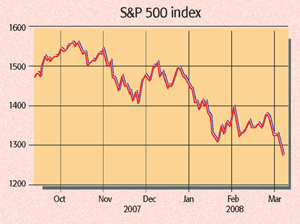Buy and hold’s your best bet
Stockmarkets breed day traders constantly looking to profit from short-term price swings. But is a strategy of trying to sell at all the market's peaks and troughs actually a good one?
Get the latest financial news, insights and expert analysis from our award-winning MoneyWeek team, to help you understand what really matters when it comes to your finances.
You are now subscribed
Your newsletter sign-up was successful
Want to add more newsletters?

Twice daily
MoneyWeek
Get the latest financial news, insights and expert analysis from our award-winning MoneyWeek team, to help you understand what really matters when it comes to your finances.

Four times a week
Look After My Bills
Sign up to our free money-saving newsletter, filled with the latest news and expert advice to help you find the best tips and deals for managing your bills. Start saving today!
Heavy motorway traffic always exposes life's market-timers drivers who fruitlessly dart in and out of lanes in search of a short cut. Similarly, stockmarkets breed day traders constantly looking to profit from short-term price swings. But is a strategy of trying to sell at all the market's peaks and buy in its troughs actually a good one?
The first problem with it is the number of methods that claim to throw up clear buy and sell signals to follow. You could copy directors' deals, sell after profit warnings, track share-price moving averages, look for repetitions of chart patterns, check the position of the planets, and so on. Trouble is there is a mountain of evidence showing that none of them really work.
Richard Duprey notes on Motley Fool that between 1986 and 2005 the S&P 500 grew at an average rate of 11.9% per year, for example. Yet a research report by Dalbar.com shows the average investor only managed 3.9%, largely thanks to over trading. This not only has a horrible tendency to gobble up profits through costs, such as tax, bid-to-offer spreads and commissions, but also ups the odds of making mistakes and missing all the best days. Missing the best 30 days during the period 1990 to 2005 would have reduced the end sum to just a third of the $51,354 held by someone who sat tight all the way through.
MoneyWeek
Subscribe to MoneyWeek today and get your first six magazine issues absolutely FREE

Sign up to Money Morning
Don't miss the latest investment and personal finances news, market analysis, plus money-saving tips with our free twice-daily newsletter
Don't miss the latest investment and personal finances news, market analysis, plus money-saving tips with our free twice-daily newsletter

A market-timing strategy not only needs to catch these days, but somehow manage to avoid the worst investing days too. This is all pretty tricky given that many of the biggest winning and losing investing days, weeks or months happen back to back when sentiment is volatile. This means that market timers must be right a stunning 82% of the time just to match buy-and-hold returns, says Nobel Laureate William Sharpe.
The reason buy and hold works better, says Seekingalpha, is that, long term, share prices tend to rise more than they fall. So any dips are eventually ironed out in the end there is more risk in being out of the market than in it. However, that quite clearly doesn't mean you can just buy and hold any old junk: time alone won't correct a poor investment.
So, always spend time looking for sound companies that are fundamentally strong and avoid the latest "must-haves", such as 1990s hyped internet stock Webvan, which was briefly valued at $1.2bn, but lasted just 18 months before being valued at zero.
Successful buy-and-hold investors also buy their winners as cheaply as possible, recognising that "there are limits to what is a reasonable price for any asset". A study by Yale's Robert Shiller over the period 1881 to 2005, for example, shows that, following decades where the p/e ratio was 20-25, the subsequent returns were close to zero. Today's p/e, calculated by comparing share prices to average earnings over the past ten years, may be heading down from a lofty 26 in February as US share prices drift south. But as the Financial Times's John Authers points out, that "is not a positive indicator for equities".
Get the latest financial news, insights and expert analysis from our award-winning MoneyWeek team, to help you understand what really matters when it comes to your finances.
Tim graduated with a history degree from Cambridge University in 1989 and, after a year of travelling, joined the financial services firm Ernst and Young in 1990, qualifying as a chartered accountant in 1994.
He then moved into financial markets training, designing and running a variety of courses at graduate level and beyond for a range of organisations including the Securities and Investment Institute and UBS. He joined MoneyWeek in 2007.
-
 Should you buy an active ETF?
Should you buy an active ETF?ETFs are often mischaracterised as passive products, but they can be a convenient way to add active management to your portfolio
-
 Power up your pension before 5 April – easy ways to save before the tax year end
Power up your pension before 5 April – easy ways to save before the tax year endWith the end of the tax year looming, pension savers currently have a window to review and maximise what’s going into their retirement funds – we look at how